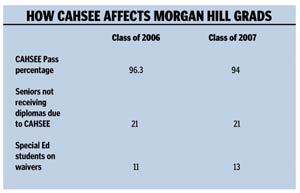A very small number of Morgan Hill Unified School District’s
Class of 2007 will not walk across the stage with the rest of the
seniors during this weekend’s graduation ceremonies, according to
district officials.
Morgan Hill – A very small number of Morgan Hill Unified School District’s Class of 2007 will not walk across the stage with the rest of the seniors during this weekend’s graduation ceremonies, according to district officials.
Director of Curriculum and Assessment Pat Blanar said last week that 94 percent of the current class of seniors at Live Oak High, Sobrato High and Central Continuation High have passed both parts of the California High School Exit Exam (CAHSEE).
Three students from Central Continuation High, 18 students from Live Oak High and 13 Sobrato High students have not passed one or both parts of the exam, Blanar said.
Out of those, she added, 13 of them are special education students, meaning they will get waivers and can participate in the graduation ceremony as long as they have completed the other requirements, and only three of the 34 students are not either English-language learners or special education students.
The exit exam, which is given to high school students beginning in the 10th grade, has two parts, and English/language arts section and a math section.
The exit exam tests eighth grade-level math and 10th grade-level English-language arts standards. Students need to correctly answer 60 percent of the questions.
Live Oak Principal Nick Boden is happy that there are only a small number of seniors who will not participate in the graduation.
“Of course, we would want everyone to do so, but we are obviously extremely proud of all of our students, they have worked very hard,” he said. “This senior class has put great effort into being successful. This is a great time of the year, and graduation is a special moment in their lives. We are glad so many of our students can celebrate it together.”
Sobrato High School Principal Rich Knapp said he, too, is proud of the work his students have been doing to pass and his staff, who have been focusing on helping kids get ready to graduate.
“Those who won’t, it’s a very small number, and we’re in the process of organizing a summer program for those students,” he said. “They will have a chance to take the test again in late July, and the district is looking at plans for a ceremony for them.”
The passing rate of students, Knapp added, “says that our teachers have been putting out an extra effort, that our kids have been working extra hard. The kids, and not just the seniors, have been taking it very seriously.”
According to the California Department of Education, students had their first crack at CAHSEE in the spring of 2001, when it was offered to volunteer ninth-graders. Later that year, an Assembly bill took away the option for ninth-grade students.
The following spring, 2002, tenth-graders who had not passed both parts of the exam took either both parts if they did not pass both, or just the section they did not pass.
In October 2001, Assembly Bill 1609 removed the option for ninth-graders to take the CAHSEE beginning with the 2002 administration. The class of 2005 took the CAHSEE for the first time in spring 2003. In July 2003, the SBE took action to move the passage of the CAHSEE as a diploma requirement to the Class of 2006. The Class of 2006 took the CAHSEE for the first time as tenth graders in February 2004. This year’s graduating class had its first crack at CAHSEE in February 2005.
The controversial test has been the subject of much courtroom wrangling, including the case of Chapman, et al v. the California Department of Education, the Superintendent of Public Instruction and the State Board of Education, that sought to delay the consequences of CAHSEE for students with disabilities. The class action lawsuit alleged the test was discriminatory, and a settlement was agreed to in September 2001, a year after it was filed.
A representative from the California Department of Education said Monday the department’s lawyers cannot comment on pending lawsuits until they are resolved.








